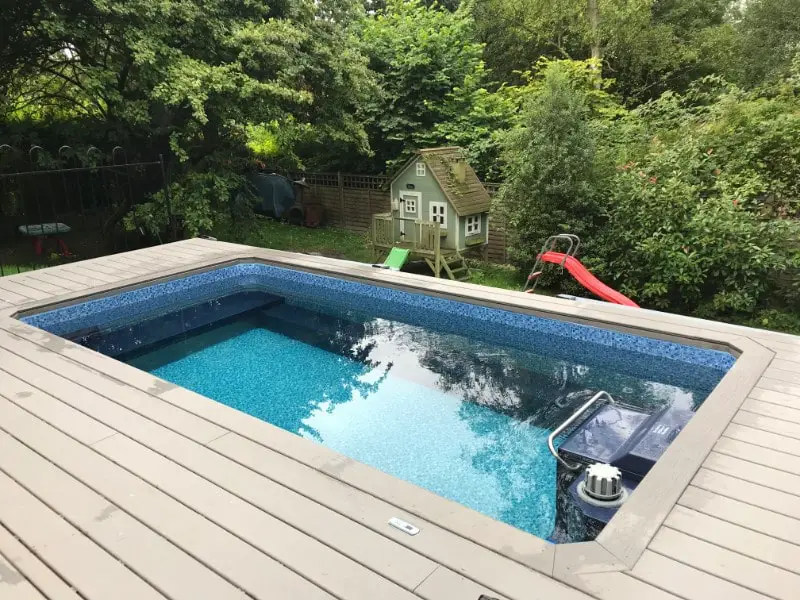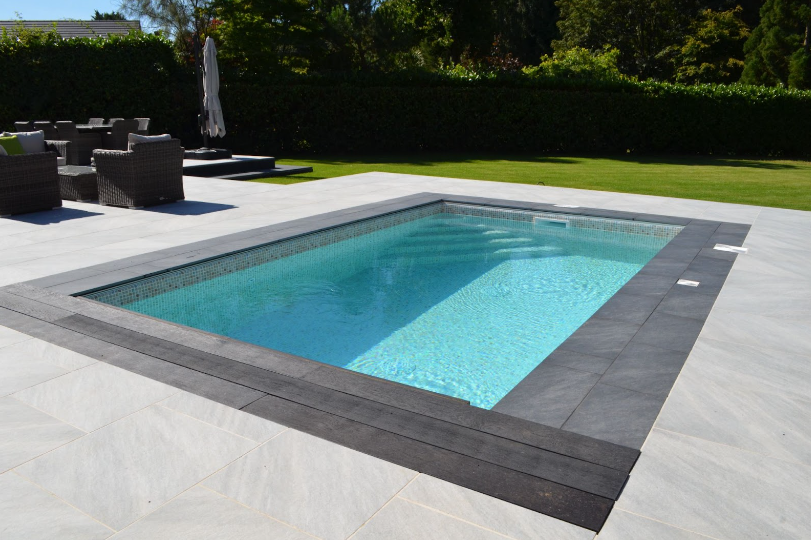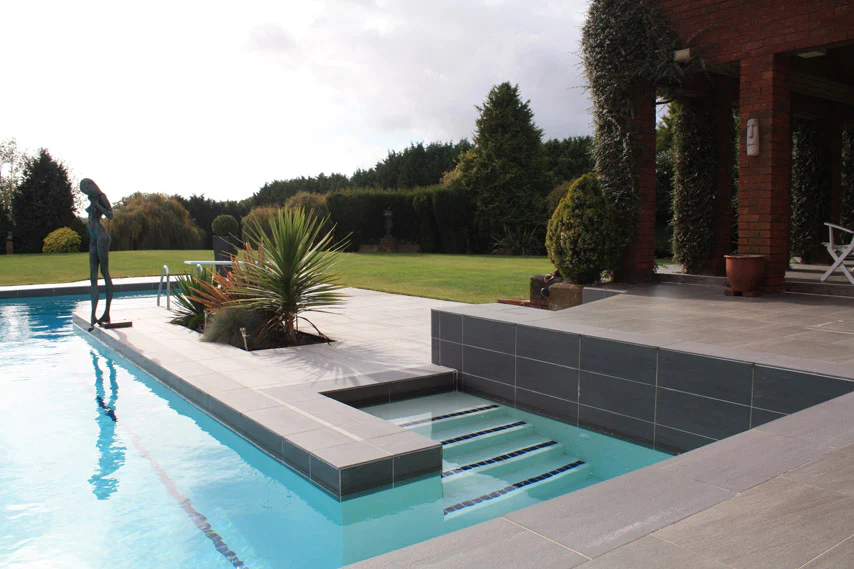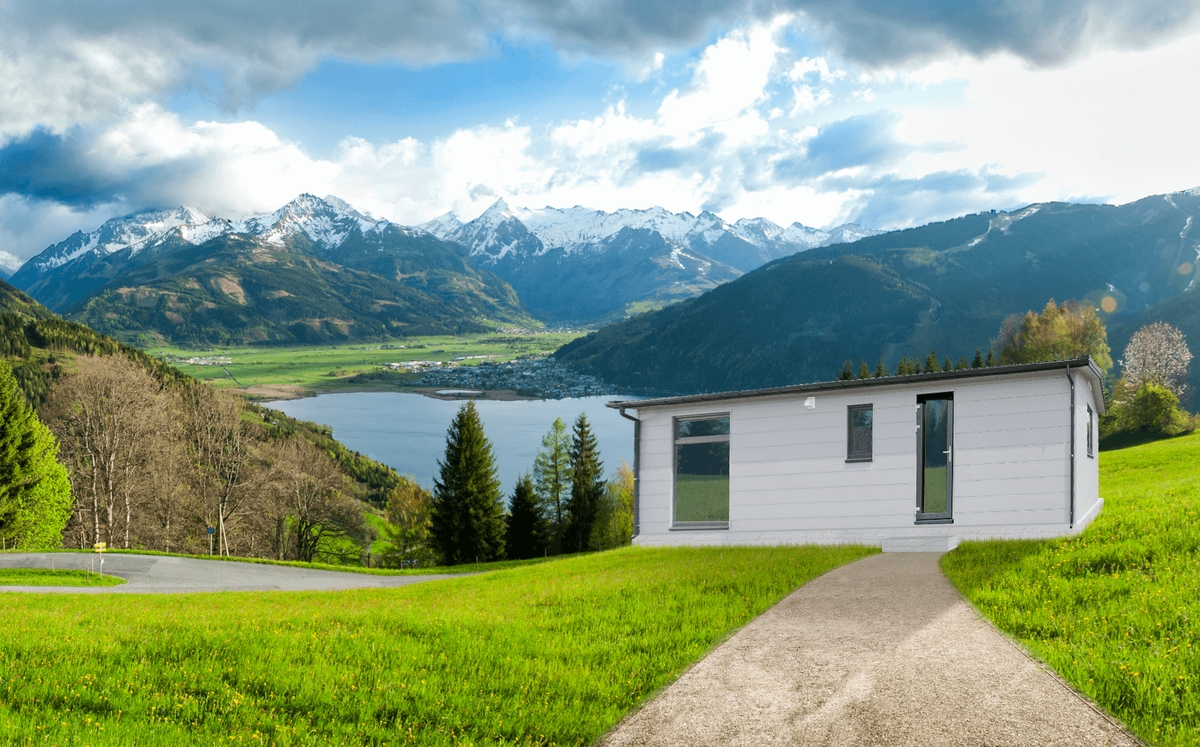In the UK, having a swimming pool is generally not considered worth it for most people due to the relatively cool climate, high maintenance costs, and limited usability throughout the year.
Whether it’s worth having a swimming pool in the UK depends on various factors, including your personal preferences, budget, and how you plan to use the pool.
The UK Climate
Discuss the variable and often unpredictable UK weather:
The United Kingdom is known for its variable and often unpredictable weather.
This reputation is well-earned, as the UK experiences a maritime climate characterized by a high degree of variability in temperature, precipitation, and weather patterns throughout the year. Several factors contribute to this variability:
Latitude: The UK is located at a relatively high latitude, which means it is exposed to changing weather systems from both the North Atlantic Ocean and continental Europe.
This geographical position leads to a significant variation in weather conditions.
Oceanic Influence: The nearby seas, such as the North Atlantic Ocean and the relatively warm Gulf Stream, have a significant impact on shaping the climate of the United Kingdom.
These bodies of water have moderate temperatures but also contribute to the UK’s frequent rainfall.
Jet Stream: The UK’s weather is strongly influenced by the jet stream, a high-altitude wind current that determines the path and strength of weather systems.
The position of the jet stream can change rapidly, leading to unpredictable shifts in weather patterns.
Topography: The UK’s diverse topography, with mountains, hills, and coastal areas, can lead to significant microclimates and localized weather variations. For example, Scotland tends to be cooler and wetter than southern England.
Seasonal Variation: The UK experiences four distinct seasons, with varying temperatures, daylight hours, and precipitation patterns. However, even within a single season, you can encounter a wide range of weather conditions.
Unpredictability: Due to the influence of the factors mentioned above, the UK weather can change rapidly.
Sunny mornings can turn into rainy afternoons and vice versa, making it difficult to plan outdoor activities without being prepared for sudden weather shifts.
Emphasize the limited summer season for pool use:

In the UK, the limited summer season for pool use is a common concern for those who enjoy swimming and outdoor water activities. The reasons for this limitation are as follows:
Climate: The UK’s climate, as discussed earlier, is characterized by a relatively short and often unpredictable summer season.
While summer can bring warmer temperatures, it is still generally milder compared to many other parts of the world. Even during the summer months, there can be cloudy and rainy days, which are not ideal for pool use.
Temperature: Although the UK can experience pleasant temperatures during the summer, they rarely reach the levels necessary for comfortable outdoor swimming.
While some brave individuals may take a dip in cooler waters, the majority prefer warmer temperatures, which are not consistently present.
Duration: The UK summer season typically spans from June to August, with July being the warmest month. This period of warm weather is relatively short compared to the rest of the year, limiting the window for pool use.
Indoor Pools: Due to the unpredictable nature of the weather, many UK residents opt for indoor swimming pools, which offer a more reliable and comfortable swimming experience throughout the year.
These indoor facilities allow people to swim even when the weather is less than ideal.
In summary, the UK’s variable and often unpredictable weather, along with its relatively short and mild summer season, can make it challenging for people to enjoy outdoor pools fully.
As a result, many people turn to indoor pools or plan their outdoor pool activities carefully to make the most of the limited warm and sunny days during the summer.
Cost Consideration
Outline the expenses involved in installing a swimming pool:
Initial Construction Costs:
- Excavation and Site Preparation: This includes digging and preparing the area where the pool will be installed.
- Pool Shell: The cost of the actual pool structure, which can vary based on size, shape, and material (e.g., concrete, fiberglass, vinyl).
- Filtration System: Installation of a filtration system to keep the water clean and clear.
- Plumbing and Electrical Work: To connect the pool to water sources, filtration systems, and electrical components such as pool lights and pumps.
- Pool Surroundings: Costs for the deck, patio, landscaping, fencing, and other elements to create a functional and aesthetically pleasing pool area.
- Permits and Inspections: Necessary permits and inspections from local authorities.
Pool Accessories:
- Pool Cover: A cover to protect the pool when it’s not in use.
- Pool Cleaning Equipment: Tools like pool skimmers, vacuums, and brushes for routine maintenance.
- Pool Safety Features: Items like safety covers, alarms, and fencing to enhance pool safety.
Optional Features:
- Pool Heating: If you want to extend the swimming season, you can install a pool heater.
- Lighting: Underwater and perimeter lighting can add ambiance and extend pool use into the evening.
- Water Features: Waterfalls, fountains, and other decorative elements.
- Pool Automation: Smart technology to control pool functions like filtration and heating remotely.
Landscaping and Aesthetics:
- Landscaping and hardscaping around the pool to create an attractive and functional space.
- Furniture and Accessories: Lounge chairs, tables, umbrellas, and other outdoor furniture.
Maintenance Equipment and Supplies:
- Chemicals: Such as chlorine, pH adjusters, algaecides, and sanitizers.
- b. Test Kits: To monitor water quality and chemistry.
- Skimmers, brushes, and vacuum equipment for regular cleaning.
- Pump and Filter Maintenance: Costs associated with the upkeep of these essential components.
Discuss ongoing maintenance, heating, and water treatment costs:
Ongoing Maintenance:
- Chemicals: Regularly testing and balancing the pool water with chemicals can cost a few hundred dollars per year.
- Cleaning: Equipment maintenance and replacements, as well as the cost of pool cleaning services if you choose to hire professionals.
- Utilities: Running the pool pump and filtration system consumes electricity, contributing to your monthly utility bills.
- Repairs: Unexpected repairs, such as fixing leaks or replacing damaged pool equipment.
- Seasonal Open and Close: The cost of preparing the pool for the swimming season (opening) and closing it for the winter.
Heating:
- Heater Operation: The expense of running a pool heater can fluctuate based on the heater type (like gas, electric, solar) and how long you use it.
- Solar Cover or Blanket: Using a solar cover or blanket can reduce heat loss and, therefore, heating costs.
Water Treatment:
- Chemicals: Regular chemical treatments to maintain water quality and prevent algae and bacterial growth.
- Water Testing: Periodic testing kits to ensure proper water chemistry.
- Salt Systems: If your pool uses a saltwater chlorination system, there may be additional expenses for salt and maintenance.
- Regular Service: Some pool owners opt for professional pool service companies to handle routine maintenance, which incurs ongoing service fees.
It’s important to note that the ongoing costs of pool ownership can vary greatly based on the type and size of the pool, the local climate and usage patterns, and the specific equipment and treatments used.
Proper maintenance and efficient equipment can help control ongoing costs and extend the life of your pool.
Frequency of Use
Highlight the importance of assessing how often the pool will be used:
Assessing how often a pool will be used is a critical consideration when planning to install or maintain a swimming pool.
This assessment helps you make informed decisions regarding the investment, maintenance, and overall value of the pool. Here are some reasons why this assessment is important:
Financial Investment: Installing a pool involves a significant financial outlay. Assessing how often the pool will be used helps determine whether the investment is justified. Infrequent use may not justify the costs involved.
Maintenance Costs: Pools require ongoing maintenance, including chemical treatments, cleaning, and equipment upkeep. Understanding how often the pool will be used can help you budget for these maintenance costs effectively.
Energy and Water Consumption: Pools consume energy for heating, pumping, and filtration. They also require a significant amount of water. Assessing use frequency helps you gauge the environmental impact and cost of these resources.
Seasonal Considerations: In regions with variable climates, like the UK, knowing how often the pool will be used can help you decide whether it’s worth investing in pool heating systems to extend the swimming season.
Health and Exercise Benefits: Frequent swimmers may see the pool as a valuable part of their exercise and well-being routine, justifying the investment. Occasional swimmers may not derive the same health benefits.
Family and Social Considerations: Pools often serve as social hubs for families and friends. Assessing use frequency helps determine whether the pool will be a valuable asset for gatherings and entertainment.
Consider the implications for occasional vs. frequent swimmers:
Occasional Swimmers:
- Cost-Effectiveness: For occasional swimmers, the financial investment in a pool may be less justifiable. They may not use the pool often enough to make up for the initial installation and ongoing maintenance costs.
- Seasonal Use: Occasional swimmers might be content with using the pool during the warmer months, avoiding the need for pool heating, which can be a significant expense.
- Alternative Recreation: If swimming is not a primary recreational activity, occasional swimmers may find alternative, less costly means of recreation.
- Maintenance Effort: While pool maintenance is still necessary for cleanliness and safety, the frequency and extent of maintenance for occasional swimmers might be less demanding.
Frequent Swimmers:
- Value of Exercise: Frequent swimmers who view the pool as an essential part of their exercise and well-being routine may find the investment in a pool more justifiable, given the health benefits.
- Cost of Heating: In regions with colder climates, frequent swimmers may consider pool heating to extend the swimming season, which can increase costs but is justifiable for those who use the pool year-round.
- Social Hub: Frequent swimmers often see the pool as a social hub for family and friends, enhancing the overall value of the pool in terms of recreation and entertainment.
- Maintenance Commitment: Frequent swimmers must be prepared for more extensive and regular maintenance to ensure water quality and pool safety.
Lifestyle and Preferences

Explore how your personal interests align with pool ownership:
When considering pool ownership, it’s essential to evaluate how your personal interests and lifestyle align with this investment.
Your individual preferences and interests can play a significant role in determining whether having a pool is a valuable addition to your life. Here are some aspects to consider:
Love for Swimming: If you have a genuine passion for swimming, water-based exercise, or relaxation in the water, pool ownership can be an excellent fit for your lifestyle.
A pool offers easy access to a space where you can enjoy your favorite activities.
Outdoor Enthusiast: If you enjoy spending time outdoors, having a pool can extend your outdoor living space and create an attractive environment for relaxation and socializing. It can be a centerpiece for outdoor gatherings.
Family-Oriented: For families, a pool can be a source of endless entertainment for children and adults alike. It offers a space for quality family time, making it an ideal addition for family-oriented individuals.
Fitness and Health: If you prioritize fitness and health, a pool can be a valuable resource for water-based exercises, which are gentle on the joints. It allows you to maintain an active and healthy lifestyle.
Entertainer: If you enjoy hosting parties, gatherings, and social events, a pool can be a fantastic attraction for your guests. It creates a unique entertainment feature and can enhance the ambiance of your gatherings.
Relaxation: For those who value relaxation and serenity, a pool offers a private oasis where you can unwind, de-stress, and enjoy the soothing effects of water.
Aesthetics: For those with a keen eye for aesthetics who delight in crafting attractive outdoor environments, a thoughtfully designed pool can become the centerpiece of your landscaping, elevating the overall visual charm of your property.
Climate Considerations: Your climate and the local weather patterns are also important factors. In regions with warm, sunny weather, a pool is more likely to align with outdoor activities and interests.
Consider the benefits of hosting pool-related activities:
Having a pool provides numerous opportunities for hosting pool-related activities, which can add value to your lifestyle and enhance your social interactions. Here are some benefits of hosting pool-related activities:
Social Hub: A pool becomes a natural gathering place for friends and family, making your home a social hub. Pool parties, barbecues, and poolside get-togethers can create lasting memories and strengthen relationships.
Entertainment: Pool-related activities entertain guests and family members of all ages. Pool games, water sports, and relaxation around the pool can keep everyone engaged and having fun.
Fitness and Health: Pool-related activities support a healthy lifestyle. Swimming, water aerobics, and other exercises in the pool can encourage physical fitness and well-being among your guests.
Relaxation: Hosting pool-related activities allows you and your guests to unwind and relax in a tranquil outdoor setting. Poolside lounging and conversations by the water offer a serene escape.
Property Value: A pool that is well-suited for hosting activities can increase the appeal and value of your property, which can be a significant asset when you decide to sell.
Customization: You can design your pool and pool area to match your hosting preferences. Whether you want to create a tropical paradise, a resort-style retreat, or a kid-friendly play area, your pool can be tailored to your unique vision.
FAQs
Is it worth having a swimming pool in the UK, considering the weather?
It can be challenging due to the cooler climate; pools are usable for a limited time each year.
What are the initial costs of installing a pool in the UK?
Costs can vary but expect a significant investment, including construction, permits, and landscaping.
What are the ongoing maintenance costs for a pool in the UK?
Maintenance costs include water treatment, heating, and cleaning and can be substantial.
Can I use the pool year-round in the UK?
No, pools are typically seasonal due to the cooler weather.
Does having a pool increase the value of my UK property?
It can add value in some cases, but it may deter buyers who don’t want the maintenance.
Are there alternatives to a private pool in the UK?
Yes, community pools, swimming clubs, and gym memberships offer alternatives.
Can I offset costs by renting the pool for events or as a holiday let?
This is possible, but it involves additional responsibilities and regulations.
How can I ensure pool safety in the UK, especially with children?
Install safety measures like fences, alarms, and covers, and consider supervision.
Is it eco-friendly to have a pool in the UK, considering water use and energy consumption?
Pools can be resource-intensive, so eco-friendly options and practices are advisable.
What is the resale value of a home with a pool in the UK?
Resale value depends on various factors, and it may not always provide a return on investment.
What’s the best approach for deciding if a pool is worth it in the UK?
Carefully weigh your budget, climate, intended use, and long-term plans before deciding. Consider expert advice.
Conclusion
To sum up, the choice to have a swimming pool is complex and should be thoughtfully weighed against various factors.
From assessing your personal interests and lifestyle preferences to weighing the financial costs, maintenance responsibilities, and safety regulations, there are numerous elements to consider.
The frequency of pool uses, the potential impact on property value, and the benefits of hosting pool-related activities are all critical considerations in the decision-making process.
Ultimately, whether a swimming pool is a valuable addition to your property depends on your individual circumstances and priorities.
Careful consideration and strategic planning can empower you to make a well-informed decision that harmonizes with your way of life and contributes to your overall well-being.









